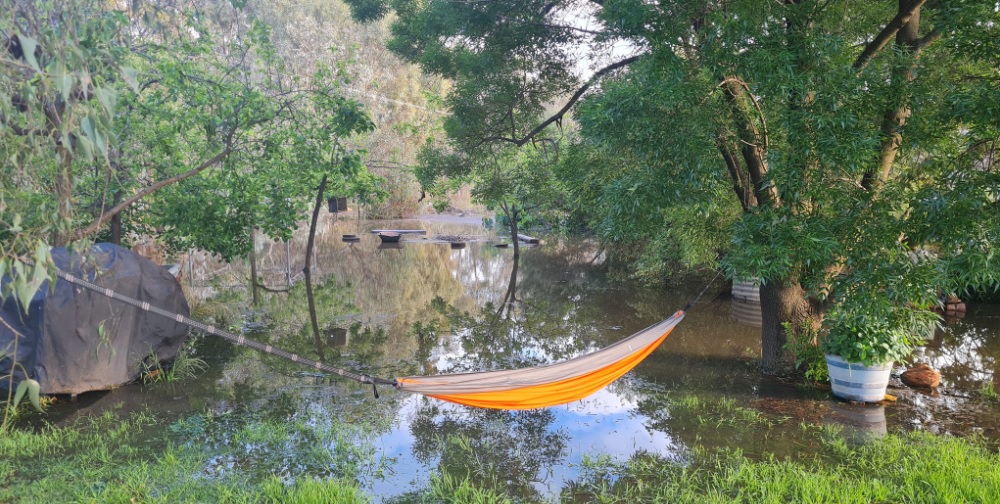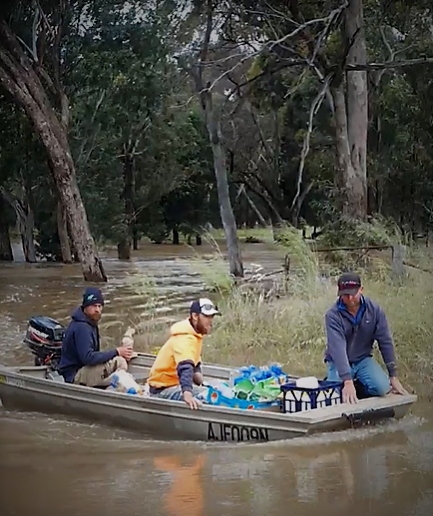
The garden at “Richmond” near Quandialla, where water views prevail right now and 10-year-old Clementine can be seen kayaking across the agapanthus. Photo: Sarah Ryan.
Out Quandialla way things are a little bit different right now as the residents adjust to life in the floodwaters.
Everywhere you look there’s water – the weight of which miniaturises trees, houses and sheds; renders cars useless, bewildered livestock motionless and gives rise to novel situations.
For instance – tractors dripping (not literally) with squealing schoolchildren on their way to school and vessels gliding around the small village – if a sailing boat floated by they would not be surprised – but, instead, there goes a grocery-laden tinny bound for The Bland Hotel, the local (literally) watering hole and general store.
It’s possibly the only time the mailperson hasn’t been able to get through, but out on The Bland – the long flat open country that lies way west of Young, beyond Bribbaree – flooding is an adjustment the locals have to make from time to time.
Explorer John Oxley was the first European to investigate the area in 1817, proclaiming that, “from want of timber, grass and water, it would never be inhabited by civilised man”.
Anything but bland – but actually named after a Sydney doctor – the country, with distant blue scalloped edging that is mountains, is a majestic example of what many would call a savannah – that by dawn and dusk, drought and flood is tranquil yet commanding.
It’s the sort of place one would look upon and believe anything was possible.

Getting bread and milk to the Bland Hotel is a little harder these days! Photo: The Bland Hotel, Quandialla
Oxley be damned, squatters – recognising the area’s agricultural potential – began to settle the district in 1833 and here in this small catchment, veined by creeks and waterways fed by those yonder hills and mountains – vast sheep and cattle runs were introduced.
Such is the lay of the land, flooding is a common occurrence; the sort of event one takes in their stride and is good for a few giggles.
Sarah and Trevor Ryan, operate the livestock grazing property and merino stud “Richmond” near Quandialla where Sarah also runs her business, the Quandialla Candle Company.
The family have occupied that pastoral holding for 123 years and it’s been long the rule of thumb that if the rains are heavy around Young, expect it to reach Quandi – 65 kilometres away – about three days later.
Like most locals, flooding is just an adjustment they make every so often. The only difference being the levels.
“This is the highest I’ve ever seen it here,” Sarah said, “but Trevor remembers it getting up to the house in 1990.”
So deep that daughter Clementine, 10, and one of her school buddies, has been speeding across the garden in a kayak.
So deep when the principal couldn’t make it to school in the first wave of flooding, as the waters briefly abated, she crept through with a caravan and is now nicely set up in the school yard.
“We don’t really get cut off, you just can’t get to West Wyalong, Grenfell, Temora or Young,” Sarah said. “We can get into Quandi so we’re a little better off than most.”
In terms of the farm – Sarah said Trevor hasn’t been able to get onto paddocks in his ute for months, using instead his trusty side-by-side.
“Thank God we don’t have crops because they’d be all under water,” Sarah said, “but the sheep are just standing in water; it’s so flat here the water just sits, it doesn’t get away, it lies there like a swamp and every now and then we try to find a rise so they can stand there for a while, but right now it’s so wet we can’t even get to the sheep.
“Trev will have to slosh out there soon to check on them,” she added. “Fingers crossed they’ll all be OK.”
The 349 people of Quandialla take it in their stride.
“People’s spirits are up, and it’s a bit of a novelty when you’ve got to cross the creek in a tractor,” Sarah said, “but it’s not so funny for those people who have lost crops.”
Nor for the school bus driver who makes the twice-daily trip from Temora transporting high school students dodging deep potholes along a particular 10-kilometre stretch that has grown increasingly worse since the harvest of 2021.
“I don’t know how he does it,” said Sarah. “All roads heading out of town are absolutely unbelievably terrible.”
But this week the Melbourne Cup was celebrated with a Calcutta on Monday night at The Bland Hotel, where business must be so good they had no time to talk.






